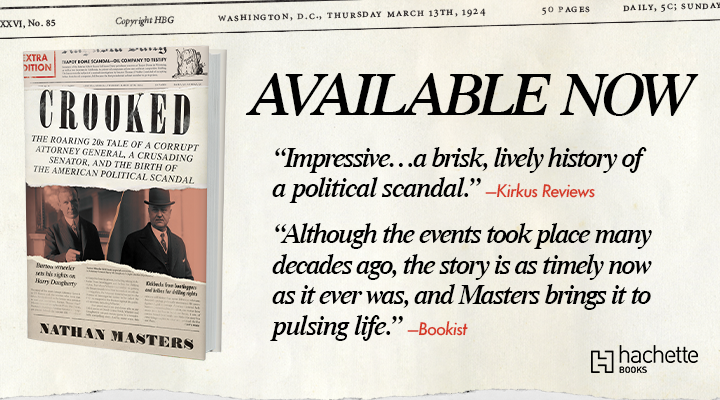CROOKED Excerpt
CROOKED – Chapter Excerpt

Only the president and a few trusted aides knew the attorney general’s whereabouts on the morning of September 1, 1922. That he’d left the capital was public knowledge: there had been no hiding his departure the previous day as his westbound train steamed out of Washington’s Union Station. His ultimate destination, however, wasn’t quite clear, and in the midst of a nationwide railway strike that had crippled the economy and stoked fears of armed revolution, the attorney general’s absence from the District of Columbia was conspicuous. To deter questions, the Justice Department announced that he was visiting his mother’s family in Columbus, Ohio. This disinformation was credulously reported by the Washington press.
So, when Attorney General Harry Daugherty materialized in courtroom 627 of the Chicago Federal Building, striding through the side door with a thick legal document in hand, an audible tremor rattled the chamber’s marble and mahogany walls. The nation’s top lawyer rarely appeared in court and certainly never in district court proceedings such as these, so far from the capital. Now, here he was in a Windy City courtroom, interrupting a busy docket of Prohibition cases.
Spectators crowded to the front for a better look. While Daugherty’s sixty-two years showed themselves in his thinning hair and drooping jowls, he was still in his prime. He was a large man, in both body and intellect, and his presence commanded the room. Reporters scampered for the telephones. Even Judge James H. Wilkerson seemed caught up in the moment, until he finally gaveled his courtroom back to order.
“The Court observes that the Attorney General of the United States is present,” Wilkerson said. “Has he any business to bring to the attention of the Court?”
The attorney general did. As far as he was concerned, nothing less than the survival of the American republic had brought him on this secret mission to Chicago.
The nationwide strike by four hundred thousand railway shopmen, who were protesting two successive 12 percent cuts in pay, was now entering its third month. With only half the nation’s trains running, the American economy had ground to a halt. Worse, sporadic violence was breaking out between picketers and strikebreakers, and the ongoing dispute threatened to plunge the country into all-out war between labor and capital. A revolution, Daugherty believed, was exactly the aim of the Red agitators behind the strike. Now he’d come all the way to Chicago, where the union was headquartered, to bring the full weight of the American justice system down upon the strikers. By arriving under cover of darkness and appearing in the courthouse unannounced, he’d caught his enemies off guard. Not a single lawyer for the unions was present—nor was one required for this ex parte proceeding.
In his hand were fifty-one typewritten pages, completed on the long train ride from Washington. With a judge’s signature, these pages would become the most sweeping temporary restraining order ever imposed on American labor, enjoining the workers from peaceful picketing, newspaper interviews, meetings, soapbox speeches—essentially any words or actions promoting the strike, anywhere in the United States. The order would be enforced by special agents of the Bureau of Investigation, US marshals, and even army troops if necessary. It was probably unconstitutional. It was certainly unprecedented. But, Daugherty believed, it was necessary. President Warren G. Harding agreed and had given the maneuver his blessing.
“It is with great regret,” Daugherty told the court, “that I am compelled to institute this proceeding on behalf of the government.” As he presented his case, the attorney general made a great show of his reluctance, slowing upon certain words or phrases, suggesting that he wished their utterance unnecessary.
“The government of the United States,” he said, “will never lift its hand against or touch a torch to the welfare of labor in its legitimate pursuit.” But in his view, this strike was not a legitimate action—not when it stopped the trains from distributing the nation’s agricultural output. “No labor leader,” he continued, “will be permitted by the government of the United States to laugh in the frozen faces of a famishing people without prompt prosecution and proper punishment.”
When he finished, all eyes turned to Judge Wilkerson. Even the face of Abraham Lincoln, painted on a frieze high above the dais, seemed to stare expectantly. Another judge might have waited to read the briefs or hear oral arguments before granting such a sweeping injunction— especially without opposing counsel present. But Daugherty had reason to be optimistic.
The fix was in.
At least, that’s what critics would later charge. Only a few months before, Daugherty had plucked Wilkerson from the relative obscurity of the Illinois state prosecutor’s office to replace Judge Kennesaw Mountain Landis, a titan of the federal judiciary who was resigning to become the first commissioner of major league baseball. With his reputation for absolute incorruptibility, Landis was thought by team owners to be the only man capable of cleaning up a sport still reeling from the Black Sox scandal, in which a gambling syndicate bought off eight members of the Chicago White Sox and fixed the 1919 World Series. Landis left big shoes to fill, but Daugherty assured President Harding that he’d found a suitable replacement.
At Daugherty’s insistence, James H. Wilkerson was nominated for the vacant seat on the US District Court for the Northern District of Illinois. The Senate confirmed him, as it did most low-level judicial nominees, without debate. And when Wilkerson took his oath and donned the black robe of justice for the first time, Daugherty sent an emissary, Assistant Attorney General Rush Holland, to congratulate the judge on his lifetime appointment. It was a subtle reminder of a favor owed. Now, it seemed, the attorney general had traveled to Chicago in person to collect on his debt.
From the bar, Daugherty looked hopefully toward the bench. Wilkerson granted the injunction.
Daugherty’s injunction had its intended effect. The striking workers, their voices muffled and willpower broken, returned to their jobs. Trains steamed across America once again. And yet, his shrewd legal maneuvering would incur great political costs. The American Federation of Labor pledged revenge. The House of Representatives entertained articles of impeachment against the attorney general. Even some of Daugherty’s fellow cabinet members voiced outrage.
Like a political lightning storm, the injunction electrified the American Left. But amid the flashes and thunder over Washington and Chicago, Daugherty didn’t notice the cyclone starting to spin under the big sky of Montana.
There, news of the injunction arrived just three days after Burton Kendall Wheeler’s victory in the Democratic primary for US Senate. Wheeler was no friend to corporate interests. The forty-year-old frontier lawyer, a transplant from Massachusetts, had fearlessly battled Montana’s entrenched corporations on behalf of the powerless. He’d taken on the rail- roads whose excessive freight rates were bankrupting the state’s farmers. He’d fought the copper monopoly that exploited the state’s miners. When he was campaigning for governor two years earlier, his brash, uncompromising style had sometimes gotten him in trouble. Once, he narrowly escaped a lynch mob by hiding overnight in a boxcar. His refusal to bend to pressure—even the threat of death—had won him the admiration of Montana’s downtrodden. Now, running for federal office for the first time, Wheeler needed a new target for his populist ire, ideally one with a national profile. With his injunction, Harry Daugherty had stepped conveniently into Wheeler’s sights.
Along a campaign trail that took him through pine mountains and windswept prairie, Wheeler raged against the attorney general in his Yankee accent, his wily blue eyes and tousled hair accentuating his anger. He savaged his Republican opponent, Rep. Carl Riddick, for supporting “Daughertyism,” which he denounced as being “for the selfishness of Wall Street against the interests of the common people.” He reminded Montana’s working classes that he’d always been on their side. “This is your fight as well as mine,” he told a packed house in the mining town of Anaconda, “and it is up to you to say at this time whether the big interests of this nation are to have another representative in the Senate, or whether you want to send me to fight for your interest there as I have fought in this state to protect the common people against the encroachments of special privilege.”
BURTON WHEELER UNDERSTOOD his new adversary—and the potential depth of his villainy—better than most. As US attorney for the District of Montana from 1913 to 1918, Wheeler had always exercised restraint in summoning the judicial power of the United States. Amid the hysteria of the Great War, he refused to prosecute antiwar dissenters—a principled but unpopular stand that ultimately cost him his job. Prosecutors, he believed, should take great care in setting the machinery of justice into motion, especially when that machinery included jail cells and gallows trapdoors. Now, Wheeler was appalled that the nation’s prosecutor-in-chief would mobilize the criminal justice system against the striking workers, who, after all, were only resisting a wage cut. That he would imprison anyone who dared resist was beyond appalling—it was antidemocratic.
Wheeler soon invented new ways to slash at Daugherty. After the war, Congress had tasked the attorney general with prosecuting the so-called wartime fraud cases in which defense contractors systematically overcharged Washington for weapons, aircraft, and munitions. In one notorious example, the Wright-Martin Aircraft Corporation had overcharged the War Department by $2,267,342, including $91,925 for employing detectives, $844 for dinners, and $995 for cigars—despite never delivering a single warplane to the European front. Under Daugherty, however, the Justice Department had taken little action against such politically connected companies. In a new stump speech, Wheeler scorched the attorney general for “protecting the profiteers who stabbed the soldiers in the back during the war.” The veterans who packed Montana’s union halls and town squares roared their approval.
As Wheeler sharpened his populist rhetoric, he had no idea how deep Daugherty’s misbehavior might run. But he knew that the powers of an attorney general were truly awesome, constrained only by institutional norms and judicial independence. Now that the injunction had called the effectiveness of those checks into question, what was stopping Daugherty—if he really was as villainous as Wheeler imagined—from running the Justice Department as a personal vengeance machine? From weaponizing the department’s Bureau of Investigation against his political opponents? From using his discretion to investigate and prosecute for political gain? Only Congress, channeling the righteous indignation of the people, exercising its subpoena power to compel testimony and produce documentary evidence, could expose the government’s darkest secrets to sunlight.
In Washington, Daugherty was already swatting away one congress- man’s feeble attempt at oversight. Rep. Oscar Keller, a pro-labor Republican from Minnesota, had introduced articles of impeachment against the attorney general, only to have the tables turned at the impeachment hearings, where Keller himself was made the subject of inquiry. The congressman suffered a nervous breakdown and fled the capital before the committee could even vote to dismiss the charges against the attorney general.
Wheeler assured voters he would do better. “Have patience and leave it to me,” he promised. “I’ll get Daugherty!”
Montanans liked what they heard. On November 7, 1922, they went to the polls and sent Wheeler to the Senate by a 12 percent margin. The stage was set for a showdown that would profoundly reshape the Justice Department, the Bureau of Investigation, and even the Senate—and forever change the way political scandal played out across America.
